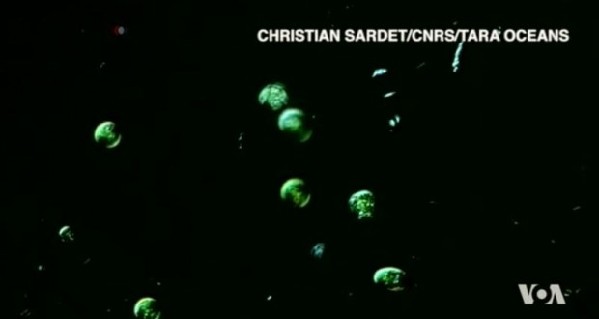當(dāng)前位置: Language Tips> VOA聽(tīng)力> Normal Speed News VOA常速
分享到
Scientists trying to predict future changes in our climate are using every possible source of data to make their calculations. Lately, they have learned that one of the most sensitive instruments could be floating right in front of them - tiny clumps of organic matter that drift in the ocean.

As if materializing from a different dimension, the submersible device called PELAGRA (PElagic LAGRAngian sediment trap) slips below the surface and sinks into a research pool at the National Oceanography Centre, in Southampton, England.
Soon, two such devices will be deployed to the South Atlantic to collect samples of so-called 'marine snow.'
"Marine snow is composed of dead phytoplankton which sort of clump together to form flakes and then they're heavy enough to sink down into the deep ocean. It can also be formed of little animals which eat the little plants and then they poop out that carbon, and then their fecal pellets are very heavy and they sink down to the bottom of the ocean, also carrying lots of carbon with them," said biogeochemist Stephanie Henson.
Although invisible to the naked eye, phytoplankton are so abundant that they are responsible for half of all the carbon absorbing photosynthetic activity on earth.
Understanding that process could help scientists create more advanced computer models of global environmental changes.
The challenge was to build a submersible device that could float between 50 and 500 meters deep. That's where scientists say all this carbon is being absorbed, and beginning its journey to the bottom of the sea.
"The way that we do that is by putting them in tanks of water... and adding weights until they're just sinking; at which point we know they have the same density as the water that they're sitting in," said Project Leader Richard Sanders.
PELAGRA will suck ocean water with marine snow into containers and periodically bring them to the surface for detailed study.
Scientists hope that PELAGRA devices will help them answer another interesting question - why is marine snow more abundant in some parts of the ocean than in others.
Vocabulary
plankton:浮游生物(總稱)
poop:糞便
phytoplankton:[植] 浮游植物(群落)
來(lái)源:VOA
編輯:丁一
上一篇 : Greater Care for Military Dogs
下一篇 :
分享到
關(guān)注和訂閱


口語(yǔ)
關(guān)于我們 | 聯(lián)系方式 | 招聘信息
電話:8610-84883645
傳真:8610-84883500
Email: languagetips@chinadaily.com.cn